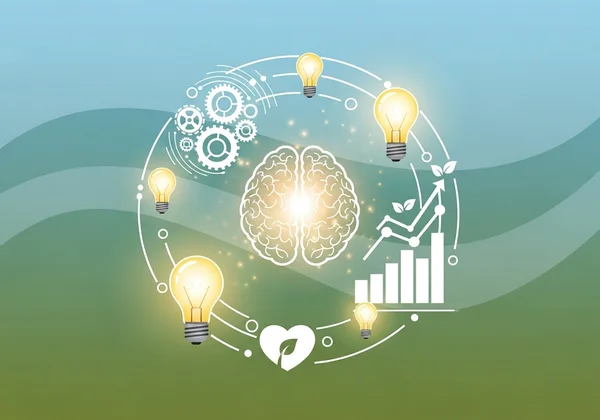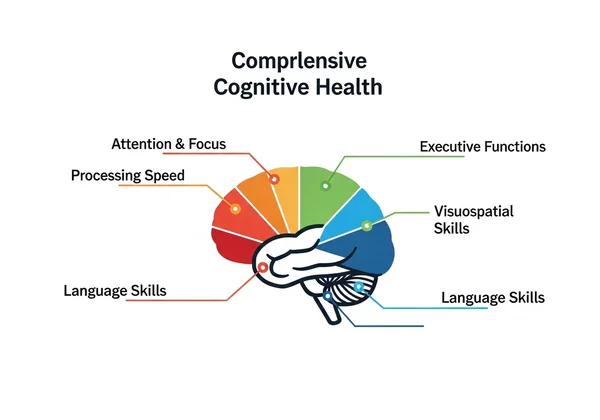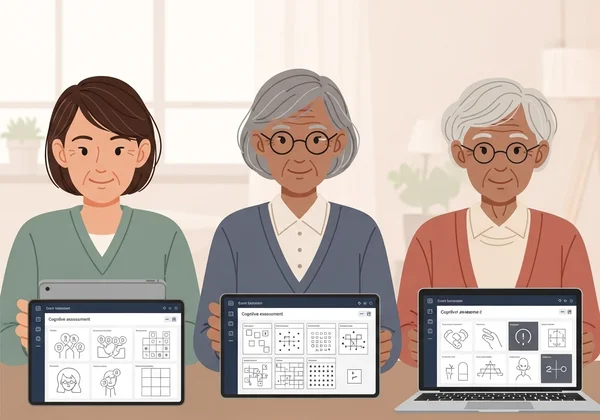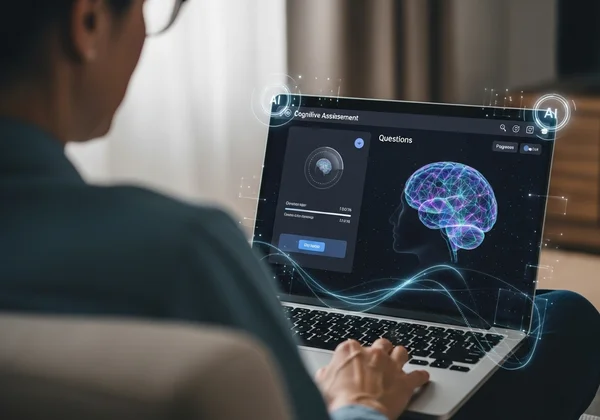Proactive Cognitive Assessment for Adults: When to Check Your Brain Health
September 7, 2025 | By Gideon Albright
Have you ever misplaced your keys or forgotten a name and wondered, "Is this normal?" As we navigate the complexities of adult life, questions about our memory, focus, and mental sharpness naturally arise. A proactive cognitive assessment is a powerful tool for understanding your brain's performance, but many people are unsure when or why they should consider one. Why would someone need a cognitive assessment? This guide will explore the benefits of taking charge of your mental wellness, clarifying when a brain health check can be a vital part of your personal health journey.
Taking the first step is often the hardest, but understanding your cognitive profile can be an empowering experience. It provides a valuable baseline and offers insights that can help you maintain your mental vitality for years to come. If you're ready to gain clarity, you can get started today with a comprehensive evaluation.
Why Proactive Cognitive Assessments Matter for Adults
Thinking about our cognitive health can feel daunting, but approaching it proactively is a game-changer. It shifts the focus from worrying about potential problems to empowering yourself with knowledge. A regular check-in, much like a physical check-up, allows you to understand your current abilities and monitor them over time, providing a clear benchmark for your brain health.
This process isn't about finding flaws; it's about discovering your unique cognitive strengths and pinpointing areas you can improve and support. By taking a proactive stance, you can implement targeted strategies to enhance your mental performance, adapt to changes gracefully, and build confidence in your cognitive resilience.

Beyond Memory: Understanding Comprehensive Cognitive Health
When we think about cognition, memory is often the first thing that comes to mind. However, comprehensived cognitive health is much broader. It encompasses a wide range of mental processes that we use every day to navigate the world. These include:
- Attention and Focus: Your ability to concentrate on a task while filtering out distractions.
- Executive Functions: The high-level skills that help you plan, organize, solve problems, and regulate your emotions.
- Processing Speed: How quickly you can take in information, understand it, and respond.
- Visuospatial Skills: Your capacity to perceive and interpret visual information about the world around you.
- Language Skills: The ability to communicate and understand others effectively.
A thorough assessment evaluates these different domains, giving you a holistic picture of your brain's performance. Grasping this full spectrum is crucial for recognizing your unique cognitive profile.

Identifying Early Signs of Cognitive Change
One of the most significant benefits of proactive testing is the ability to identify subtle shifts in your cognitive function before they become significant concerns. How do you tell if you have cognitive decline? Often, the early signs are mild and easy to dismiss as normal aging or stress. They might include increased difficulty with multitasking, finding the right words, or remembering recent events.
Establishing a baseline with a free cognitive assessment allows you to track your abilities over time. If you notice changes from your baseline in the future, you have objective data to discuss with a healthcare professional. This early awareness is crucial, as it provides the best opportunity to address underlying causes and implement supportive lifestyle changes.
The Ideal Age for a Brain Health Check
A common question is, "At what age should you have a cognitive test?" While there's no single magic number, different life stages present unique reasons to consider a brain health check. The goal is not to wait for a problem but to integrate cognitive wellness into your long-term health plan.
For many, middle adulthood is an ideal time to establish a first baseline. As life's demands on our cognitive resources peak, understanding our mental strengths and weaknesses can be incredibly beneficial. For older adults, regular assessments become an important tool for monitoring health and maintaining independence.
Cognitive Milestones in Middle Adulthood (40s-50s)
The 40s and 50s are often characterized by high-pressure careers, family responsibilities, and significant life transitions. During this period, you might notice subtle changes in your ability to juggle multiple tasks or learn new information quickly. These are often normal shifts, but establishing cognitive milestones through an assessment can provide valuable reassurance and insight.
A baseline assessment in middle adulthood helps you understand your peak cognitive performance. This data serves as a personal benchmark that can be referenced for years to come. It’s a proactive step toward long-term brain health, allowing you to identify and build upon your cognitive strengths while you are at your busiest.
Prioritizing Elderly Cognitive Assessment
For individuals aged 60 and older, prioritizing an elderly cognitive assessment becomes increasingly important. As the risk of age-related cognitive conditions increases, regular monitoring helps distinguish between normal aging and signs that may warrant a conversation with a doctor. It provides peace of mind for both the individual and their loved ones.
These assessments can help identify challenges early, enabling timely interventions and lifestyle adjustments that can support brain health and quality of life. For caregivers, having access to an objective online tool can be an invaluable resource for understanding a loved one's needs and facilitating more productive discussions with healthcare providers. A detailed memory test can be a great starting point.

Common Reasons to Consider a Cognitive Assessment Test
Beyond age, various personal and medical factors can prompt the need for a cognitive assessment test. Recognizing these triggers can help you decide if now is the right time to gain a deeper understanding of your brain function. These reasons are deeply personal and valid, reflecting a commitment to your overall well-being.
Whether you're driven by personal curiosity, family history, or a desire to manage a health condition more effectively, an assessment provides the clarity you need. It is a step toward transforming uncertainty into actionable knowledge.
Personal Concerns About Memory, Focus, or Mental Processing
Have you found yourself struggling with memory, focus, or mental processing more than usual? Perhaps you're having trouble concentrating during long meetings, forgetting appointments, or finding it harder to follow complex conversations. These experiences are common, but when they become persistent and cause you concern, an assessment can help clarify what's going on. It can validate your feelings and provide data-driven insights into why you might be feeling this way.
Family History and Genetic Predispositions for Cognitive Conditions
If you have a family history of conditions like Alzheimer's disease or dementia, you may be more attuned to your own cognitive health. Understanding your genetic predispositions can be empowering, and a cognitive assessment serves as a proactive monitoring tool. It allows you to take control of your health journey by establishing a baseline and tracking any changes over time, giving you valuable information to share with your doctor.
Managing Chronic Health Conditions That Impact Brain Health
Many chronic health conditions are known to impact brain health. Conditions such as diabetes, cardiovascular disease, depression, and sleep apnea can affect cognitive functions like attention, processing speed, and executive function. If you are managing one of these conditions, incorporating a regular cognitive skills assessment test into your health routine can help you and your doctor monitor its impact and adjust your treatment plan accordingly.
Dispelling Myths & Navigating Your Online Cognitive Assessment Options
The idea of taking a cognitive test can be intimidating, partly due to common myths and misconceptions. With the rise of digital tools, it's more important than ever to understand how an online cognitive assessment works and what it can offer. Modern platforms are designed to be accessible, confidential, and scientifically robust.
Navigating your options means looking for tools that are transparent about their methodology and clear about their purpose. An assessment is not a final judgment but a snapshot in time—a source of information to guide you. When you are ready, you can take our comprehensive test from the comfort of your home.
Is an At-Home Cognitive Assessment Reliable?
A key question many people ask is, "How can I test my cognitive ability at home reliably?" The reliability of an at-home cognitive assessment depends entirely on the quality of the tool. Simple online quizzes may be entertaining but lack scientific rigor. However, platforms developed by neuropsychologists and AI experts, like ours, are built on clinically validated principles. These tools use standardized tasks to ensure that the results are consistent and meaningful, providing a trustworthy initial look at your cognitive abilities.
What an AI-Powered Cognitive Assessment Can Tell You
So, what happens if you "fail" a cognitive test? The concept of pass/fail doesn't really apply. A modern, AI-powered cognitive assessment provides a nuanced and personalized report, not a simple score. Instead of a single grade, you receive a detailed breakdown of your performance across different cognitive domains. The AI-powered analysis can identify subtle patterns in your responses, highlighting your cognitive strengths and areas that may be challenging. This information is translated into actionable insights and suggestions, empowering you to take the next steps. Receive your detailed report to see what it can tell you.

The Role of Your GP in Your Cognitive Health Journey
While online tools provide invaluable insights, it's crucial to understand their role in your broader cognitive health journey. A question we often hear is, "Can a GP do a cognitive assessment?" Yes, your general practitioner can perform initial screenings and refer you to a specialist if needed. An online assessment is a powerful tool to bring to that conversation. It is not a diagnostic tool, but it provides structured, objective data that can help you and your doctor have a more informed discussion about your concerns and decide on the best course of action.
Summary
Being proactive about your brain health is one of the most empowering decisions you can make for your long-term wellness. Understanding when and why to consider a cognitive assessment demystifies the process and transforms it from a source of anxiety into a tool for self-knowledge and growth. It allows you to build a comprehensive picture of your mental vitality, celebrate your strengths, and support areas that need attention.
Don't wait for concerns to escalate. Take charge of your cognitive wellness today with accessible, confidential, and scientifically grounded tools. By embracing knowledge, you are investing in a sharper, more resilient mind for the future. Ready to learn more about your unique cognitive profile? Start your assessment now.
Frequently Asked Questions About Adult Cognitive Assessments
At what age should you consider a cognitive assessment?
There is no "perfect" age, but establishing a baseline in middle adulthood (40s-50s) is highly beneficial. For older adults (60+), regular assessments are recommended as part of a proactive health monitoring plan to track changes over time.
Why would an adult need a proactive cognitive assessment?
An adult might seek a proactive assessment to establish a health baseline, investigate personal concerns about memory or focus, monitor the cognitive impact of a chronic health condition, or simply as part of a commitment to lifelong learning and self-improvement.
Can I check my cognitive ability at home reliably?
Yes, you can, provided you use a high-quality, scientifically designed tool. Platforms like ours, developed by experts, use validated methods and AI analysis to provide reliable and detailed insights into your cognitive function from the privacy of your own home.
What happens if my cognitive assessment results raise concerns?
If your results indicate potential challenges, the report will provide actionable insights and suggestions. The most important step is to share these results with your doctor or a healthcare professional for a conversation about next steps. The goal of our tool is to provide clarity and guidance, not a diagnosis.
Can my general practitioner (GP) perform a cognitive assessment?
Your GP can conduct initial cognitive screenings and is a vital partner in your health journey. Bringing the detailed report from an online tool like ours to your appointment can facilitate a more productive discussion and help your doctor determine if a specialist referral is necessary. You can explore your cognitive skills before your next visit.